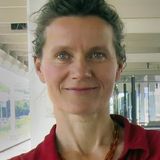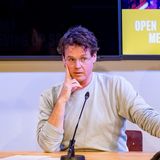Vehicle speeds, whether cars, trucks, or e-bikes, profoundly effects our experience of cities. What feels too fast or too slow often depends on the place we occupy in traffic: a pedestrian may feel endangered by a motorist’s speed, while the motorist simply wants to reach their destination. Traditionally, fixed speed limits have been the solution, but these don’t account for the dynamic nature of urban spaces, nor the emergence of new vehicle types. Unsafe streets push people into safer vehicles, but in doing so, we risk neglecting making safer streets. To create safer, more livable streets, we need to rethink our approach to speed regulation, considering the evolving complexity of urban life.
This event marks the start of our journey towards the Speed Summit in 2025. The conversation opens with Carl Honoré, Luca Bertolini, and Onno Kramer exploring what should come first for liveable cities: safe streets or safe vehicles.
About the speakers
Luca Bertolini is a Professor of Urban Planning at the University of Amsterdam’s Faculty of Social and Behavioural Sciences. His work focuses on integrating transport and urban planning to foster humane, sustainable and equitable cities. He explores concepts and practices that drive transformative change in urban and mobility systems while promoting collaboration across academic disciplines and between academia and society.
Carl Honoré is an advocate of the Slow Movement, which promotes the benefits of decelerating in various aspects of life. Carl’s message is both simple and transformative: to thrive in a fast-paced world, one must embrace slowing down. His dynamic and engaging keynotes and workshops, whether online or in person, resonate with diverse audiences, including business leaders, entrepreneurs, sales professionals, engineers, lawyers and medical practitioners.
Onno Kramer is the Head of Collection Management at Accel, where he works with well-known brands like Batavus and Sparta in the Benelux. Before this, he was Head of Design, where he focused on planning and designing future products, creating a consistent look for brands, and ensuring designs were centred on the needs of users. Onno has a master in Integrated Product Design from the Technical University of Delft.
Marjolein de Lange is a cycling and walking advocate and expert, affiliated with Amsterdam Bike City and the Amsterdam Cyclists’ Union (Fietsersbond Amsterdam). She is also the co-author of Amsterdam Bike City, a book that explores how cyclists have successfully reclaimed the streets of Amsterdam.
Listen to the Townmaking podcast series which delved into the concept of speed in an urban setting and making traffic safer by building safer vehicles. Listen to the Townmaking episodes (below) to dive deeper into the ideas that help shape the conversation.

This is the first episode in a three-part series exploring the dynamics of speed in urban environments. Indranil Bhattacharya and host Servaz van Berkum will delve into the intricate relationships between speed, liveability, and safety. How does travel speed impact our surroundings? How do we perceive speed, and how do others perceive our movement? Moreover, how should we regulate speed, and why is it necessary to do so?

This is the second episode in our three-part series exploring the dynamics of speed in urban environments. In this episode, Townmaking engineer Paul Timmer joins host Servaz van Berkum to discuss Intelligent Speed Adaptation (ISA). ISA is a system designed to alert drivers or even take control when a vehicle exceeds the local speed limit. Since July 2022, the European Union has mandated ISA for all new vehicles, including cars and lorries. We’ll delve into how ISA works, its objectives for enhancing road safety, and the challenges it faces when implemented without considering societal impacts

This episode is the final installment of our three-part series on speed dynamics in urban environments. In this episode, host Servaz van Berkum continues his conversation with Townmaking engineer Paul Timmer. This time, they delve into Adaptive Speed Governance (ASG), an innovative driver-assistance system created by the Townmaking Institute in partnership with the City of Amsterdam. Initially developed for e-bikes, ASG can enhance the safety of all types of vehicles without relying on cameras or sensors or infringing on privacy. It requires no filming or redesigning of public spaces to regulate speeds.










